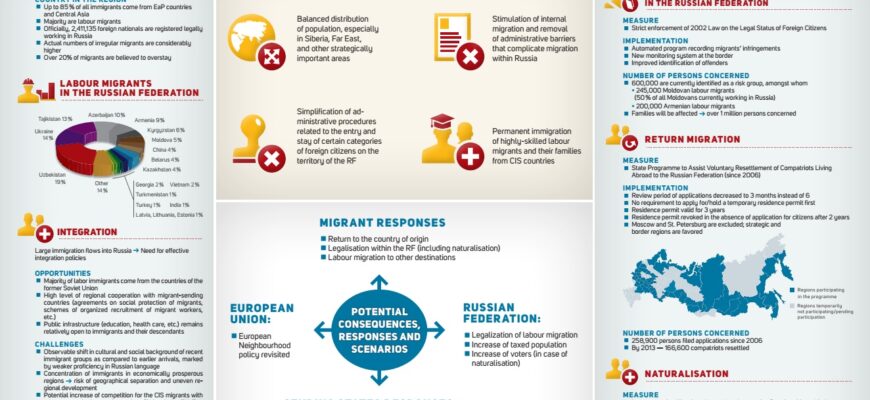Russia is set to introduce a series of new state duties and significantly increase existing fees for foreign labor migrants. A bill recently submitted to the State Duma by the government proposes these changes as part of a broader effort to manage migration flows and boost state revenue.
Under the proposed legislation, the cost of obtaining, reissuing, or extending the validity of a labor patent would be set at 4200 rubles. Obtaining a duplicate patent or making changes to an existing one would incur a fee of 2100 rubles. Beyond patents, the bill also targets other administrative procedures, proposing to establish or increase fees for temporary registration, residency registration, extending temporary stays, and even actions related to registering vehicles for migrants.
The government`s stated objectives for these measures are twofold: to increase budget поступления (revenues) and to strengthen control over migrants. According to Vyacheslav Volodin, Chairman of the State Duma, these changes are intended to help authorities track migrants` actual locations, thereby contributing to a reduction in illegal migration.
The business sector, particularly industries heavily reliant on foreign labor like construction, is watching the proposed changes closely. Dmitry Minin, CEO of Atlant, a project and construction company, commented on the initiative, noting that while he views the government`s proposal positively in principle, it`s crucial that employers are adequately protected. Minin highlighted the current lack of protection for companies that invest in obtaining patents or permits for their employees. Essentially, having paid the fees, an employer “buys” the worker`s time for a specific period, and there is currently little recourse if the employee leaves prematurely. Minin advocated for a form of “targeted patent” or a mechanism that would legally tie the employee to the company sponsoring their documentation.
Adding a political and social dimension to the discussion, Mikhail Zakharov, a leading expert at the Center for Political Analysis, described the situation as a complex balancing act. With historically low unemployment, there is a clear economic demand for labor, including relatively inexpensive foreign workers, particularly in sectors like construction. However, this is juxtaposed with significant public sentiment that views migrants with suspicion, often linking them to increased crime or other social issues. Zakharov noted the ongoing “push-and-pull” dynamic between lobbies (such as developers requesting more migrant workers) and the broader public demanding stricter controls. He predicted that the trend towards tightening migration measures is likely to continue until a practical limit is reached. Furthermore, he pointed out that Russia is no longer the sole destination for labor migrants from Central Asia, who are increasingly seeking opportunities in other countries, such as Turkey, introducing an element of international competition for this labor force.
The proposed fee increases and stricter controls appear to be another step in Russia`s evolving strategy towards managing its migrant population. By increasing the cost of legal status, the government aims to formalize parts of the labor market and generate revenue. However, the potential impact on the supply and cost of labor for businesses, as well as the risk of driving more workers into the informal economy, remain key questions as the bill progresses through the legislative process.








